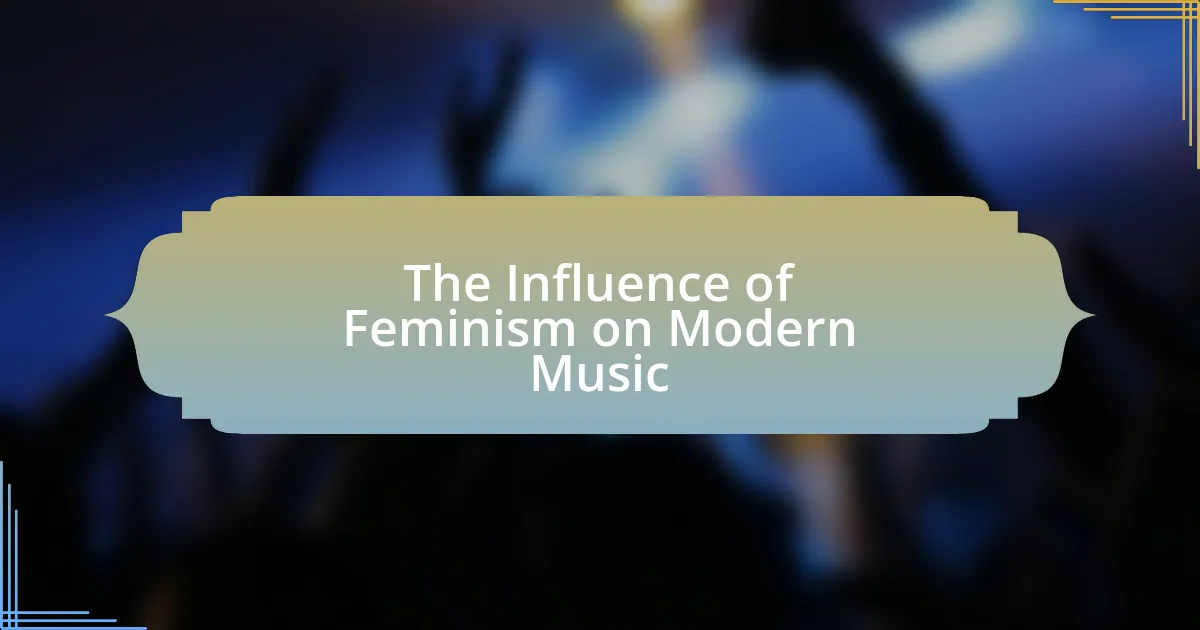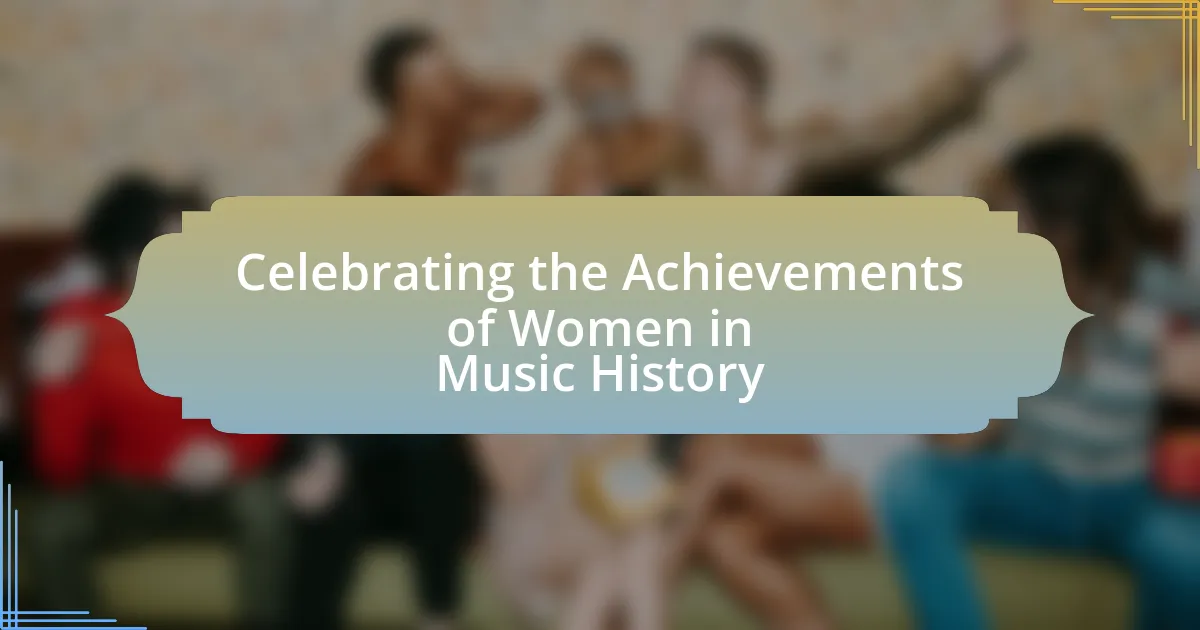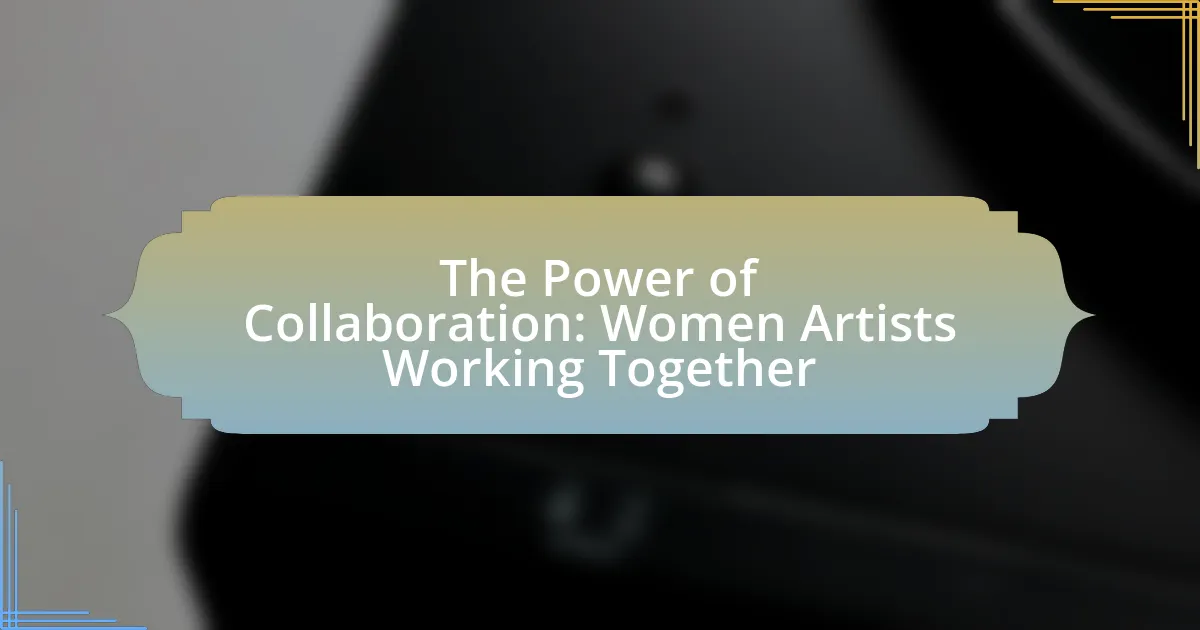The article focuses on the significant contributions of women in rock history, highlighting their roles as pioneers who challenged societal norms and reshaped the music industry. It discusses key figures such as Janis Joplin, Joan Jett, and Stevie Nicks, detailing their impact on the genre and the milestones achieved by female artists over the decades. The article also examines the societal changes that have influenced women’s roles in rock, the challenges they have faced, and the importance of celebrating their achievements to inspire future generations. Additionally, it addresses contemporary female rock artists who continue to redefine the genre and the initiatives supporting women’s representation in the music industry.

What defines the significance of women in rock history?
Women in rock history are significant for their groundbreaking contributions that challenged societal norms and reshaped the music industry. Pioneers like Janis Joplin and Joan Jett not only broke barriers in a male-dominated genre but also influenced countless artists across generations. Their impact is evidenced by the fact that women have been integral in the evolution of rock music, with artists like Stevie Nicks and Debbie Harry achieving commercial success and critical acclaim, thereby paving the way for future female musicians. The Rock and Roll Hall of Fame recognizes this significance, with numerous female artists inducted, highlighting their essential role in the genre’s history and development.
How have women shaped the rock genre over the decades?
Women have significantly shaped the rock genre over the decades by breaking barriers, influencing musical styles, and redefining the role of female artists in a predominantly male industry. Pioneers like Janis Joplin and Joan Jett challenged societal norms and showcased powerful vocal performances, while artists such as Stevie Nicks and Debbie Harry brought unique styles and perspectives that expanded the genre’s appeal. In the 1990s, bands like Hole and the Spice Girls further transformed the landscape, blending rock with pop and addressing themes of female empowerment. The impact of women in rock is evident in the increasing presence of female artists in charts and festivals, with statistics showing that female-led bands and solo acts have gained more recognition and commercial success in recent years.
What are some key milestones achieved by women in rock music?
Key milestones achieved by women in rock music include the formation of all-female bands, such as The Runaways in the 1970s, which paved the way for future female musicians. Additionally, Joan Jett’s success with “I Love Rock ‘n’ Roll” in 1981 marked a significant moment, as she became one of the first women to achieve mainstream success in rock music. In 1997, the induction of women like Janis Joplin and Aretha Franklin into the Rock and Roll Hall of Fame highlighted their contributions to the genre. Furthermore, the emergence of female rock artists in the 1990s, such as Alanis Morissette and Courtney Love, challenged gender norms and expanded the representation of women in rock. These milestones collectively demonstrate the evolving role and recognition of women in the rock music industry.
How have societal changes influenced women’s roles in rock music?
Societal changes have significantly expanded women’s roles in rock music by challenging traditional gender norms and promoting gender equality. The feminist movements of the 1960s and 1970s, for instance, encouraged women to assert their identities and pursue careers in music, leading to the emergence of influential female rock artists like Janis Joplin and Joan Jett. Additionally, the rise of the LGBTQ+ rights movement has fostered a more inclusive environment, allowing diverse expressions of identity within rock music. This shift is evidenced by the increasing visibility of women in various roles, from performers to producers, as seen in the success of artists like Sheryl Crow and Paramore’s Hayley Williams. Overall, societal changes have not only allowed women to participate more fully in rock music but have also reshaped the genre itself, making it more reflective of diverse experiences and perspectives.
Why is it important to celebrate iconic women in rock history?
Celebrating iconic women in rock history is important because it acknowledges their significant contributions to the genre and promotes gender equality in a historically male-dominated field. Women like Janis Joplin, Joan Jett, and Aretha Franklin not only shaped the sound of rock music but also challenged societal norms, paving the way for future generations of female artists. Their influence is evident in the rise of female musicians across various genres, as seen in the increased visibility of artists like Billie Eilish and Halsey. Recognizing these women helps to inspire young girls to pursue careers in music and empowers them to break barriers, reinforcing the idea that talent knows no gender.
What impact do these women have on future generations of musicians?
These women have a profound impact on future generations of musicians by serving as trailblazers who challenge gender norms and inspire creativity. Their contributions to rock music have paved the way for female artists, demonstrating that women can excel in a male-dominated industry. For instance, artists like Joan Jett and Patti Smith not only broke barriers but also influenced countless musicians, as evidenced by their enduring presence in music and culture. Their legacy encourages young female musicians to pursue their passions and assert their voices, fostering a more inclusive and diverse music landscape.
How does recognition of women in rock challenge gender stereotypes?
Recognition of women in rock challenges gender stereotypes by showcasing their talent and influence in a male-dominated industry. Female rock musicians, such as Joan Jett, Stevie Nicks, and Debbie Harry, have not only achieved commercial success but have also redefined traditional gender roles associated with music. Their presence and achievements disrupt the notion that rock music is exclusively for men, demonstrating that women can be powerful, creative, and authoritative figures in this genre. For instance, Joan Jett’s success with the Blackhearts and her role as a producer highlight women’s capabilities beyond performance, further challenging stereotypes about women’s roles in music.
![]()
Who are some of the most iconic women in rock history?
Some of the most iconic women in rock history include Janis Joplin, Joan Jett, and Stevie Nicks. Janis Joplin, known for her powerful voice and emotional performances, became a symbol of the 1960s counterculture and was one of the first female rock stars to achieve major success. Joan Jett, with her band The Runaways and later as a solo artist, is celebrated for her contributions to punk rock and her hit “I Love Rock ‘n’ Roll,” which became an anthem for female empowerment. Stevie Nicks, as a member of Fleetwood Mac and a successful solo artist, is recognized for her distinctive voice and songwriting, contributing to the band’s massive success in the 1970s and 1980s. These women have left an indelible mark on rock music, influencing countless artists and shaping the genre’s landscape.
What contributions did artists like Janis Joplin and Joan Jett make to rock music?
Janis Joplin and Joan Jett significantly shaped rock music through their powerful performances and pioneering roles for women in the genre. Janis Joplin, known for her emotive vocal style and raw stage presence, broke barriers in the late 1960s, becoming one of the first female rock stars to gain widespread acclaim, exemplified by her iconic performances at festivals like Woodstock and her hit songs such as “Piece of My Heart.” Joan Jett, emerging in the late 1970s, furthered this legacy by co-founding the all-female band The Runaways and later achieving solo success with hits like “I Love Rock ‘n’ Roll,” which challenged gender norms in a male-dominated industry. Both artists not only influenced the sound of rock music but also inspired future generations of female musicians to pursue careers in the genre, solidifying their roles as trailblazers in rock history.
How did Janis Joplin’s style influence the rock scene of her time?
Janis Joplin’s style significantly influenced the rock scene of her time by introducing a raw, emotional vocal delivery and a powerful stage presence that challenged gender norms in music. Her blend of rock, blues, and soul showcased a unique authenticity that resonated with audiences, paving the way for future female artists. Joplin’s performances, characterized by her passionate singing and unrestrained persona, inspired a generation of musicians to embrace vulnerability and express their emotions openly. This impact is evident in the rise of female rock artists in the 1970s and beyond, who drew inspiration from her fearless approach to performance and artistry.
What legacy did Joan Jett leave for female rock musicians?
Joan Jett’s legacy for female rock musicians is characterized by her role as a pioneering figure who broke gender barriers in a male-dominated industry. She co-founded The Runaways, one of the first all-female rock bands, which paved the way for future female artists by demonstrating that women could successfully perform and write rock music. Jett’s hit song “I Love Rock ‘n’ Roll” became an anthem for empowerment and rebellion, showcasing her ability to blend commercial success with a strong, independent image. Her influence is evident in the careers of numerous female rock musicians who cite her as an inspiration, including artists like Courtney Love and Brody Dalle. Jett’s commitment to authenticity and her refusal to conform to industry standards have solidified her status as a role model for aspiring female rock musicians.
Which contemporary female rock artists are continuing this legacy?
Contemporary female rock artists continuing the legacy of iconic women in rock history include Hayley Williams, frontwoman of Paramore, and Lzzy Hale of Halestorm. Hayley Williams has been influential in the rock genre since the early 2000s, known for her powerful vocals and songwriting, while Lzzy Hale has garnered acclaim for her dynamic performances and vocal prowess, winning a Grammy Award. Both artists have paved the way for future generations, showcasing the impact of women in rock music today.
How are artists like Hayley Williams and St. Vincent redefining rock music today?
Hayley Williams and St. Vincent are redefining rock music today by blending genres and challenging traditional norms within the genre. Hayley Williams, through her solo work, incorporates elements of pop, electronic, and alternative music, showcasing emotional vulnerability and personal storytelling, which expands the thematic scope of rock. St. Vincent, known for her innovative guitar work and avant-garde approach, pushes the boundaries of rock by integrating art pop and experimental sounds, while also addressing complex social issues in her lyrics. Both artists exemplify a shift towards inclusivity and diversity in rock, as they prioritize authenticity and self-expression, thus attracting a broader audience and inspiring a new generation of musicians.
What themes do modern female rock artists explore in their music?
Modern female rock artists explore themes such as empowerment, identity, mental health, and social issues in their music. For instance, artists like Halsey and Alanis Morissette address personal struggles and societal expectations, reflecting a broader narrative of resilience and self-acceptance. Additionally, themes of feminism and gender equality are prevalent, as seen in the works of artists like Brandi Carlile and Hayley Williams, who challenge traditional gender roles and advocate for women’s rights. These themes resonate with audiences, highlighting the evolving landscape of rock music and the significant contributions of women within the genre.

What challenges have women faced in the rock industry?
Women in the rock industry have faced significant challenges, including gender discrimination, lack of representation, and sexual harassment. Gender discrimination manifests in unequal opportunities for women in terms of access to recording contracts, radio play, and festival lineups, often resulting in fewer women being recognized or promoted in the industry. The lack of representation is evident in the historical underrepresentation of female artists in rock music, with studies indicating that women comprise only about 20% of artists in the genre. Additionally, sexual harassment remains a pervasive issue, with many women reporting inappropriate behavior from industry peers, which can create hostile work environments and deter women from pursuing careers in rock music. These challenges highlight the systemic barriers that women have had to navigate in order to succeed in the rock industry.
How have gender biases affected the careers of female rock musicians?
Gender biases have significantly hindered the careers of female rock musicians by limiting their opportunities for recognition, promotion, and success within the industry. Historically, women in rock have faced stereotypes that portray them as less capable or serious than their male counterparts, leading to underrepresentation in key roles such as producers, sound engineers, and festival lineups. For instance, a study by the USC Annenberg Inclusion Initiative found that only 21.7% of artists on popular music charts were women, highlighting systemic barriers that female musicians encounter. Additionally, female rock musicians often receive less media coverage and fewer performance opportunities, which further perpetuates their marginalization in a genre predominantly dominated by men.
What barriers have women had to overcome to gain recognition in rock music?
Women have had to overcome significant barriers to gain recognition in rock music, including gender discrimination, lack of access to resources, and societal stereotypes. Historically, the rock music industry has been male-dominated, leading to limited opportunities for women to perform, produce, or be taken seriously as artists. For instance, female musicians often faced challenges in securing record deals and radio play, as evidenced by the underrepresentation of women in music charts; a 2019 study by the Annenberg Inclusion Initiative found that only 22.4% of artists on the Billboard Hot 100 were women. Additionally, women in rock have had to combat stereotypes that question their musical abilities and authenticity, which has often resulted in their contributions being undervalued or overlooked.
How do industry practices impact the visibility of women in rock?
Industry practices significantly impact the visibility of women in rock by perpetuating gender biases and limiting opportunities for female artists. For instance, the predominance of male-led record labels and management teams often results in a lack of support for women musicians, leading to fewer promotional resources and media coverage. According to a 2020 study by the Annenberg Inclusion Initiative, women comprised only 21.7% of artists in popular music, highlighting the disparity in representation. Furthermore, the music industry’s reliance on traditional gender roles can marginalize female artists, making it challenging for them to gain recognition and success comparable to their male counterparts.
What initiatives exist to support women in rock music today?
Initiatives that support women in rock music today include organizations like Girls Rock Camp, which empowers young girls through music education and mentorship, and She Rocks Awards, which honors women in the music industry. Additionally, the Women’s International Music Network provides resources and networking opportunities for female musicians. These initiatives aim to increase visibility, provide education, and foster community among women in the rock genre, contributing to a more inclusive music industry.
How do organizations promote female representation in the music industry?
Organizations promote female representation in the music industry through initiatives such as mentorship programs, funding for female artists, and advocacy for gender equality in hiring practices. For example, organizations like Women in Music provide resources and networking opportunities specifically aimed at supporting women in various roles within the industry. Additionally, studies show that festivals and events that prioritize female artists, such as the all-female lineup at the 2019 Glastonbury Festival, significantly increase visibility and opportunities for women in music. These efforts collectively contribute to a more equitable representation of women in the music industry.
What role do festivals and events play in highlighting women in rock?
Festivals and events play a crucial role in highlighting women in rock by providing a platform for female artists to showcase their talent and gain visibility in a predominantly male-dominated industry. Events like the all-female festival “Girlschool” and “She Rocks Awards” specifically celebrate and promote women in rock, helping to elevate their profiles and foster community among female musicians. These gatherings not only feature performances by women but also include panels and discussions that address the challenges faced by female artists, thereby raising awareness and encouraging more equitable representation in the music scene.
What can fans do to support women in rock music?
Fans can support women in rock music by actively promoting their work and attending their concerts. By sharing music from female rock artists on social media platforms, fans can increase visibility and encourage others to discover their talent. Additionally, purchasing merchandise and albums directly from these artists helps financially support their careers. Research indicates that female musicians often face significant barriers in the industry; for example, a study by the USC Annenberg Inclusion Initiative found that only 22.5% of artists in popular music are women. Therefore, fan engagement is crucial in creating a more equitable music landscape.
How can listeners engage with and promote female rock artists?
Listeners can engage with and promote female rock artists by actively supporting their music through streaming, purchasing albums, and attending live performances. Engaging with female rock artists on social media platforms, sharing their content, and participating in discussions about their work also amplifies their visibility. According to a 2021 report by the Annenberg Inclusion Initiative, female artists represent only 22.5% of all artists in popular music, highlighting the need for increased support and promotion. By advocating for female rock artists in playlists, radio stations, and music blogs, listeners can help create a more equitable music industry.
What are some effective ways to advocate for gender equality in the music industry?
Effective ways to advocate for gender equality in the music industry include promoting female artists through visibility initiatives, implementing equitable hiring practices, and supporting organizations that focus on women’s rights in music. Visibility initiatives, such as featuring women in prominent festival lineups, can increase representation; for instance, the 2020 Glastonbury Festival made headlines for its commitment to gender balance. Equitable hiring practices, such as ensuring diverse panels for music awards and industry events, can help dismantle systemic biases. Supporting organizations like Women in Music, which provides resources and networking opportunities, further empowers women in the industry. These strategies collectively contribute to a more inclusive music landscape.




